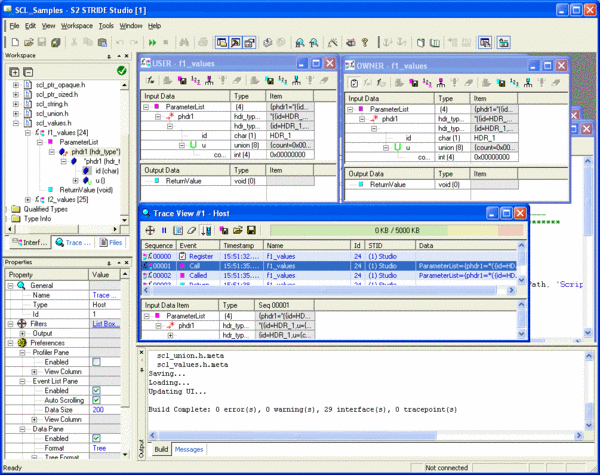Studio:STRIDE Studio: Difference between revisions
No edit summary |
No edit summary |
||
| Line 1: | Line 1: | ||
STRIDE Studio provides a graphical environment allowing software engineers to interactively create, exercise and verify code during implementation. Using a combination of Autosense, Studio's context-sensitive help, and SCL Wizards to create SCL statements, developers can easily instrument interfaces. Through STRIDE's remote interfacing mechanism and on-target interface tracing capabilities, developers can dynamically access application interfaces to execute remote function calls, send and receive remote messages, and trace on-target transactions. This capability allows developers to effectively interact with their code without writing additional test code, and enables quick implementation/testing/refactoring iterations to support agile development practices, such as test-driven development. | STRIDE Studio provides a graphical environment allowing software engineers to interactively create, exercise and verify code during implementation. Using a combination of Autosense, Studio's context-sensitive help, and SCL Wizards to create SCL statements, developers can easily instrument interfaces. Through STRIDE's remote interfacing mechanism and on-target interface tracing capabilities, developers can dynamically access application interfaces to execute remote function calls, send and receive remote messages, and trace on-target transactions. This capability allows developers to effectively interact with their code without writing additional test code, and enables quick implementation/testing/refactoring iterations to support agile development practices, such as test-driven development. | ||
[[Image:Studio_app.gif| | [[Image:Studio_app.gif|600px|center|The STRIDE Studio application]] | ||
Revision as of 01:26, 20 August 2008
STRIDE Studio provides a graphical environment allowing software engineers to interactively create, exercise and verify code during implementation. Using a combination of Autosense, Studio's context-sensitive help, and SCL Wizards to create SCL statements, developers can easily instrument interfaces. Through STRIDE's remote interfacing mechanism and on-target interface tracing capabilities, developers can dynamically access application interfaces to execute remote function calls, send and receive remote messages, and trace on-target transactions. This capability allows developers to effectively interact with their code without writing additional test code, and enables quick implementation/testing/refactoring iterations to support agile development practices, such as test-driven development.
Please refer to the STRIDE Studio section of the Online Help installed with STRIDE for more information on STRIDE Studio.
